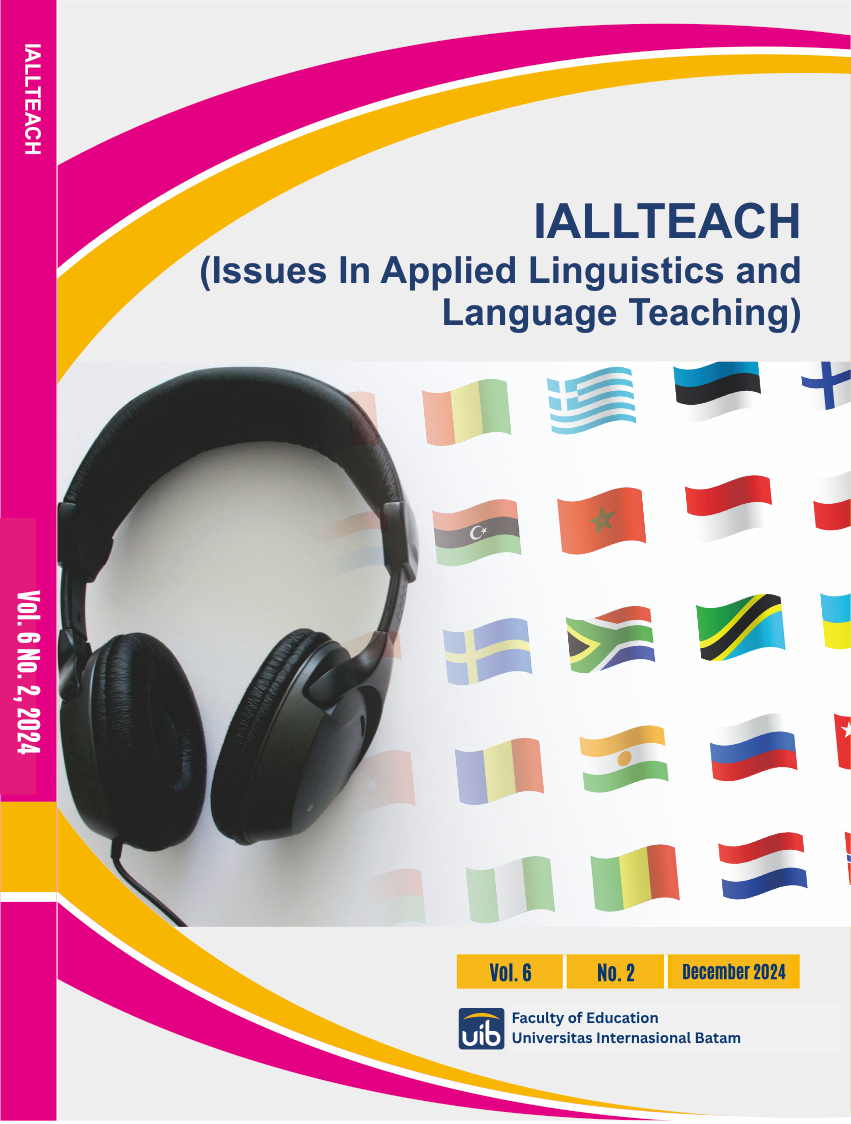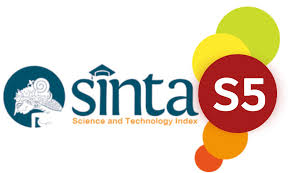Analyzıng The Needs of ICT-Integrated Englısh Language Teachıng for EFL Learners
DOI:
https://doi.org/10.37253/iallteach.v6i2.9919Keywords:
English for Foreign Learners, Information and Communication Technology (ICT), English Language Learning, Digital Literacy, Digital Learning EnvironmentAbstract
This study aims to know the need for ICT-integrated English language instruction among EFL high school students in the 21st century. It also examines the importance of digital literacy in meeting the educational requirements of learners in the digital age, the concept of a digital learning environment, and its role in developing digital literacy skills. This research applied a mixed-method approach involving qualitative and quantitative data collection techniques. The data were collected from a questionnaire that involved 40 high school students in Batam, Indonesia. The instruments used in collecting the data were observation, questionnaires, and interviews. The findings indicated that students are positive about using ICT in English Language Learning, are satisfied with ICT facilities, and are willing to use it for learning at home. Teachers agree that ICT improves English proficiency but are concerned about time, skills, and support. They also understand the impacts of the media. There is a readiness to embrace digital technologies for education.
Downloads
References
Ahmadi, M. R. (2018). The effect of information and communication technology on the English language learning of university students. Theory and Practice in Language Studies, 8(5), 541-548.
Al Arif, T. Z. Z. (2019). Indonesian University Students' Perception and Expectation towards ICT Use in Learning English as a Foreign Language. Indonesian Journal of English Language Teaching and Applied Linguistics, 4(1), 133-145.
Al-Rahmi, W. M., Alias, N., Othman, M. S., & Shamsuddin, A. (2019). Integrated technology and media for learning: Opportunities and challenges. Education and Information Technologies, 24(1), 183-207.
Al-Rahmi, W. M., Alzahrani, A. I., Yahaya, N., Alalwan, N., & Kamin, Y. B. (2020). Digital communication: Information and communication technology (ICT) usage for education sustainability. Sustainability, 12(12), 5052.
Amrullah, A., Lail, H., & Sumayani, S. R. (2023). The Efl students' perspectives on the usefulness of ict-based learning. Journal of Language and Pragmatics Studies, 2(1), 1-10.
Bieser, J. C., & Hilty, L. M. (2018). Assessing indirect environmental effects of information and communication technology (ICT): A systematic literature review. Sustainability, 10(8), 2662.
Cevik, M. (2019). Multidimensional 21st Century Skills Scale: Validity and Reliability Study. Cypriot Journal of Educational Sciences, 14(1), 11-28
Chalkiadaki, A. (2018). Digital learning environments: An overview of current trends and future directions. Information Services & Use, 38(1-2), 1-16.
Costales, J. M. (2019). Difficulties in Performance Task Authentic Assessment Among Secondary School Social Studies Teachers of Zone 2, Department of Education Division of Zambales.
Eryansyah, E., Erlina, E., Fiftinova, F., & Nurweni, A. (2019). EFL Students’ Needs of Digital Literacy to Meet the Demands of 21stCentury Skills. Indonesian Research Journal in Education |IRJE|, 3(2), 442-460. https://doi.org/10.22437/irje.v3i2.8297
Hafifah, G. N., & Sulistyo, G. H. (2020). TEACHERS’ICT LITERACY AND ICT INTEGRATION IN ELT IN THE INDONESIAN HIGHER EDUCATION SETTING. Turkish Online Journal of Distance Education, 21(3), 186-198.
Karaeng, L. G., & Simanjuntak, D. C. (2021). EXPLORATION OF EFL TEACHERS’EXPERIENCE TOWARD THE IMPLEMENTATION OF E-LEARNING AMIDST THE COVID-19 PANDEMIC: A QUALITATIVE INTERVIEW STUDY. PROJECT (Professional Journal of English Education), 4(2), 324-340.
Khan, M. A., & Kuddus, K. (2020). Digital natives and English language learning. Journal of Language and Linguistics, 19(2), 271-286.
Khan, N. M., & Kuddus, K. (2020). Integrating ICT in English Language Teaching in Bangladesh: Teachers' Perceptions and Challenges. Rupkatha Journal on Interdisciplinary Studies in Humanities, 12(5).
Kontostavlou, E. Z., & Drigas, A. S. (2019). The Use of Information and Communications Technology (ICT) in Gifted Students. Int. J. Recent Contributions Eng. Sci. IT, 7(2), 60-67.
Liu, D., Liu, X., Li, L., & Li, X. (2020). Digital literacy and English language learning in the 21st century: A literature review. International Journal of Emerging Technologies in Learning, 15(2), 49-64.
Lubis, A. R. (2018). The role of ICT in EFL learning and teaching: A literature review. English Language Teaching, 11(7), 1-8.
List, F. (2019). Digital learning environment: Definition, scope, and purpose. European Association for the Study of Science and Technology, 1-18.
Majeed, M. T. (2018). Information and communication technology (ICT) and environmental sustainability in developed and developing countries. Pakistan Journal of Commerce and Social Sciences, 12(3), 758-783.
Ozcan, B. (2018). Information and communications technology (ICT) and international trade: evidence from Turkey. Eurasian Economic Review, 8, 93-113.
Poudel, B. (2022). Some opportunities and challenges presented by information and communication technology in English language teaching. International Journal of English Language Teaching, 10(1), 1-15.
Ratheeswari, K. (2018). Information communication technology in education. Journal of Applied and Advanced research, 3(1), 45-47.
Rusydiyah, E. F., Purwati, E., & Prabowo, A. (2020). How to use digital literacy as a learning resource for teacher candidates in Indonesia. Cakrawala Pendidikan, 39(2), 305-318.
Sabiri, A. (2020). ICT in EFL teaching and learning: A systematic literature review. English Language Teaching, 13(10), 184-197.
Saykili, A. (2019). Higher education in the digital age: The impact of digital connective technologies. Journal of Educational Technology and Online Learning, 2(1), 1-15.
Spielman, D., Lecoutere, E., Makhija, S., & Van Campenhout, B. (2021). Information and communications technology (ICT) and agricultural extension in developing countries. Annual review of resource economics, 13, 177-201.
Supiandi, M. I., & Lisa, Y. (2018). The utilization of information and communication technology (ICT) on learning in the 21st century. International Journal of Academic Research and Development, 3(2), 869-875
Tican, C., & Deniz, S. (2019). Pre-service teachers’ opinions about the use of 21st century learner and 21st century teacher skills. European Journal of Educational Research, 8(1), 181-197
Tohara, M. (2021). Digital literacy in the 21st century: Conceptual and practical implications for language education. Language Learning & Technology, 25(1), 1-18.
Trust, T. (2018). 2017 ISTE standards for educators: From teaching with technology to using technology to empower learners. Journal of Digital Learning in Teacher Education, 34(1), 1-3
Van de, W., & Voogt, J. (2018). Digital learning environments in the 21st century: Current trends and emerging research directions. Education and Information Technologies, 23(4), 1511-1529.
Wrahatnolo, T. (2018). Digital learning environment and its implementation in English language teaching. Journal of English Language Teaching, 7(1), 1-14.
Xing, Z. (2018). The impacts of Information and Communications Technology (ICT) and E-commerce on bilateral trade flows. International Economics and Economic Policy, 15, 565-586.




.png)






